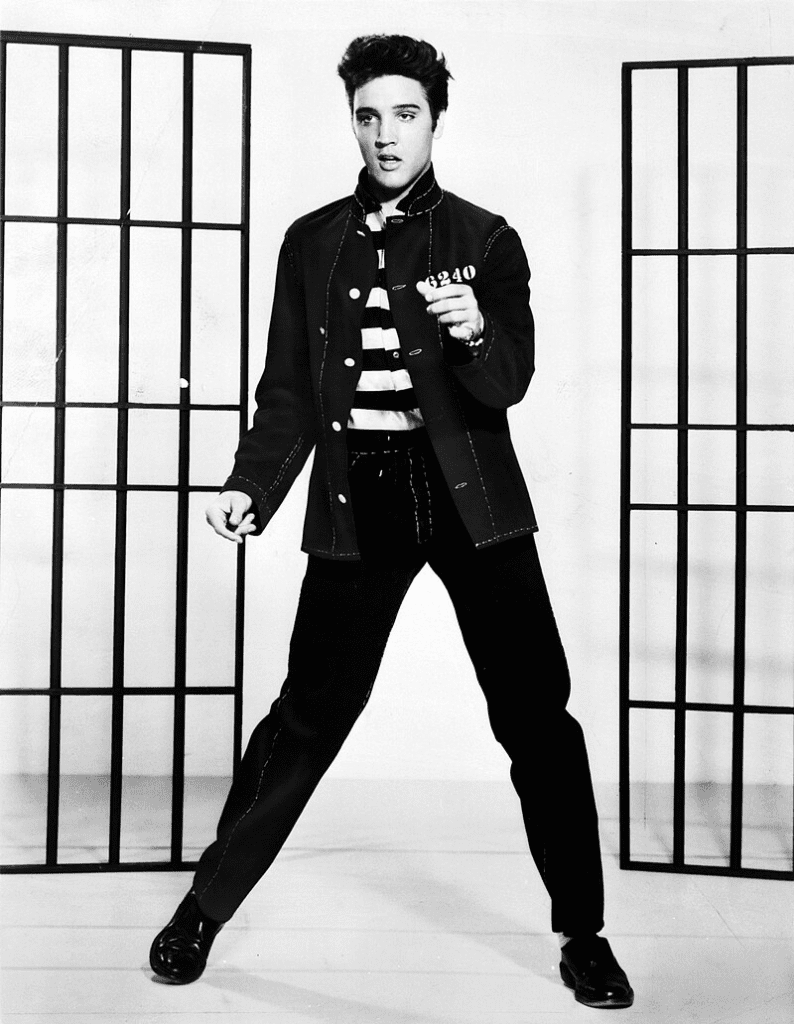Elvis Presley is celebrated worldwide for his powerful voice and electric performances, but there’s another side to “The King” that often goes overlooked—his dedication to equality and standing against prejudice. One pivotal moment at the Houston Astrodome in 1970 reveals just how committed Elvis was to supporting those close to him, particularly his African-American backing group, The Sweet Inspirations. This moment not only solidified his legacy as a music icon but also highlighted his role as a compassionate ally.
Elvis and The Sweet Inspirations: An Unlikely Partnership

The Sweet Inspirations, a groundbreaking African-American female vocal group, rose to fame in the 1960s for their soulful harmonies. Known for their work with Aretha Franklin, the group included talented singers like Myrna Smith and Sylvia Shemwell. In 1969, they were approached with an unexpected offer to tour with Elvis Presley. Skeptical at first, the group couldn’t believe that a Southern rock-and-roll star like Elvis wanted them on his team.
“Elvis Presley? What does he want us for?” Myrna Smith recalled in a 1974 interview. Their initial doubts faded after meeting Elvis, whose kindness and warmth dissolved any reservations. “He doesn’t care what color you are,” said Sylvia Shemwell. This was just the beginning of a deep, mutually respectful partnership that would last for years.
A Monumental Concert at the Houston Astrodome
In 1970, Elvis was set to perform at the Houston Astrodome—an iconic venue that marked his first major concert outside Las Vegas. This performance was also significant for The Sweet Inspirations, as it would be their debut appearance outside of Vegas alongside Elvis. But as excitement mounted, an unexpected ultimatum was presented to Elvis by rodeo officials who didn’t want him to bring his African-American singers on stage. Due to racial biases, they suggested that he “leave the black girls at home.”
It was a defining moment for Elvis, one that would reveal his true character. Rather than complying, he stood firm, declaring, “If they don’t come, I don’t come.” Elvis’ commitment to his singers sent a powerful message that transcended music; it was a stand against racial discrimination, showing his dedication to those who worked with him, regardless of color.
Elvis’ Quiet Rebellion: Making a Point with Humor
Not only did Elvis refuse to abandon The Sweet Inspirations, but he also made sure the experience sent a subtle message. According to Myrna Smith, Elvis arranged for the rodeo official’s daughter to drive the singers around the venue in a convertible. It was a quiet but pointed gesture that conveyed Elvis’ disapproval of the situation without direct confrontation.
Myrna shared, “Elvis always made sure he got even. I’m sure he said, ‘And I want your daughter to drive them.’ But at the time, we didn’t know. We learned that later.” This simple act highlighted Elvis’ commitment to treating The Sweet Inspirations with dignity, reinforcing his belief in equality and fair treatment.
True to His Word: Elvis’ Performance Becomes a Stand Against Racism
True to his word, Elvis brought The Sweet Inspirations on stage with pride, making their presence central to his performance. This wasn’t just another concert; it was a statement. By showcasing his African-American singers, Elvis used his platform to challenge prejudiced views in a way that few artists dared to at the time. For him, The Sweet Inspirations weren’t simply backup singers; they were part of his family.
The group was unaware of Elvis’ behind-the-scenes battle until years later, and when they finally learned the full story, it deepened their respect for him. To Elvis, this stand wasn’t about publicity; it was about doing what was right and ensuring that everyone who contributed to his success received equal recognition.
Elvis and The Sweet Inspirations: A Bond Beyond Music

Elvis shared a particularly close bond with The Sweet Inspirations. Their camaraderie was evident during their first meeting in Las Vegas in 1969. Elvis introduced himself in his signature humble style, as if they wouldn’t already recognize him. Over time, they grew to appreciate his kindness, charm, and unpretentious nature.
Myrna Smith recalled a special memory with Elvis when he invited her to dance at a gathering in his penthouse. She described him as shy, almost vulnerable, despite his status as a music icon. “He was just a little boy then,” she said fondly. “I looked upon him as part of my family.” This bond transcended race and fame, reflecting the genuine friendships Elvis cultivated with his team.
A Legacy of Equality and Integrity
The performance at the Houston Astrodome left a lasting impact. Not only did Elvis bring the crowd to its feet, but he also redefined his image, showing the world that he wasn’t just the “King of Rock ‘n’ Roll”; he was a man of principles. While he left the concert $1.2 million richer, the value of his stand for equality was priceless.

The Sweet Inspirations performed with Elvis through hundreds of shows from 1969 until his passing in 1977. Their harmonies became an essential part of his music, adding depth and soul to each performance. Elvis’ support for them extended beyond music, demonstrating his loyalty and belief in fairness.
A Final Reflection: Elvis, the King with a Conscience
While Elvis is remembered for his unforgettable voice and charisma, his actions at the Houston Astrodome show that he was much more than a performer. He was an advocate for equality, a friend to those who worked alongside him, and a man who wouldn’t bow to societal prejudice. In a time when it was rare for artists to speak out against racial inequality, Elvis used his influence to make a difference. He valued people for who they were, and he stood by his principles, making him a true leader in both music and humanity.
Conclusion
This little-known moment in Houston showed the world who Elvis Presley truly was—a man of character who treated everyone, regardless of race, with respect and integrity. His loyalty to The Sweet Inspirations set an example of how art can transcend cultural barriers and unify people. Elvis’ actions remind us that it’s not just talent that makes an icon but also the strength of one’s values and the courage to stand for them. Elvis Presley wasn’t only the King of Rock ‘n’ Roll; he was also a king among men, leading with compassion and justice.


